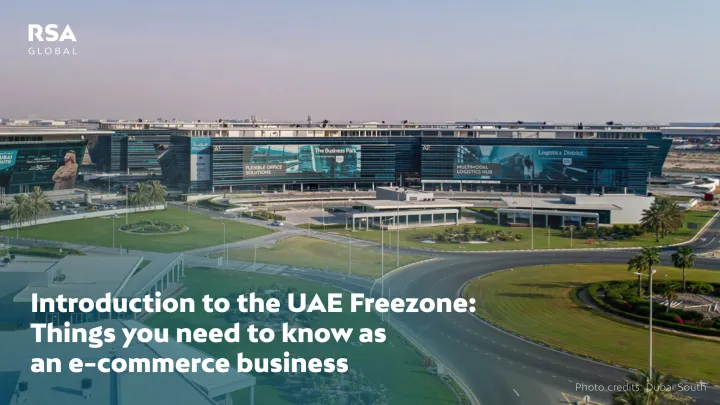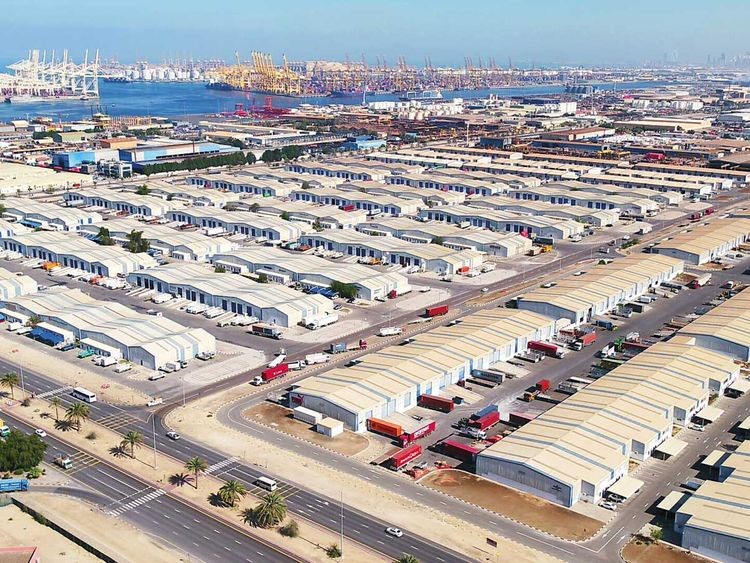Media

Introduction to the UAE Freezone: Basic things you need to know as an e-commerce business

Operating from a Free-Trade Zone offers businesses significant financial and operational advantages when it comes to processing, assembling, and distributing imported goods. Free zones are often set up to encourage foreign investment and promote economic growth by offering tax incentives, simplified customs procedures, and streamlined business regulations. These zones are typically located near ports, airports, or major transportation hubs to facilitate the movement of goods and services in and out of the zone.
Companies operating in a free zone area may be allowed to import and export goods without paying customs duties or other taxes, and they may be exempt from certain taxes. Free zones can be found in many countries around the world, including the United Arab Emirates, Singapore, and the United States. Overview of the free zone in the UAE
The e-commerce landscape in the United Arab Emirates (UAE) has seen significant growth in recent years due to a variety of factors, including high internet penetration, increasing consumer adoption of online shopping, and government support for the e-commerce industry.
Due to its proximity to and ease of access to the major trade lanes and markets, businesses from all around the world are investing to set up their presence in the country. Free zones in the UAE play a significant role in the e-commerce trade by providing a business-friendly environment with various benefits and incentives that attract local and international e-commerce businesses to set up their operations in the country.
Free Zone Authorities in the UAE
Several free zone areas in the UAE cater to various industries from knowledge or education, media, creatives, industrial operations, manufacturing, health care, finance, general trade, and e-commerce.
For this blog, we will focus on which free zones are most relevant for e-commerce businesses and what benefits this offers international sellers and brands looking to set up operations in the country.
Jebel Ali Free Zone
Jebel Ali Free Zone (JAFZA) is a flagship free zone of DP world and the largest in the world. JAFZA has become a significant contributor to the country's GDP and is home to a smart business community that provides growth opportunities and market access to 8,700+ businesses. The businesses registered in JAFZA generate an impressive $104.2 billion in trade value annually, making them a vital contributor to the UAE's economy.

Photo credits: Gulf News
Dubai Airport Free Zone (DAFZA)
Dubai Airport Free Zone (DAFZA) is a rapidly growing economic zone that was established in 1996 to attract global investors seeking business opportunities in the Middle East region. With over 2,300 international firms from around the world, DAFZA is one of the fastest-growing economic zones in the region. It has been ranked as the top free zone globally by the Foreign Direct Investment Magazine's Global Free Zones & Awards 2012/13 due to its exceptional strategic approach and well-articulated plans to serve its investors and partners.
Dubai South
Dubai South is a large-scale development in Dubai that focuses on building an aviation and logistics ecosystem centered around Al Maktoum Airport- designed to be the world's largest international airport. It is constructed to be a global transport hub and a major contributor to the economic growth of Dubai and the UAE. With business-friendly free zone benefits and a range of residential options to suit different lifestyles, Dubai South offers a living and working environment for businesses and individuals alike. The development comprises an Aviation District, Logistics District, and Business Park to support various sectors and industries.
Dubai South is one the pioneering e-commerce enablers in the country and is the home to EZDubai, a dedicated e-commerce zone strategically positioned adjacent to the airport cargo terminal, and connected to Jebel Ali Port via bonded passage as well as to major road networks giving it 360° regional and global connectivity via 150 shipping lanes, over 100 airlines and more than 240 destinations.
Dubai Multi Commodities Center
DMCC was established in 2002 and is now dedicated to supporting over 13,000 businesses from a wide range of sectors and industries, spanning from agro, energy, and financial services to precious metals such as diamonds, gold, and base metals. It serves as a business hub, offering an ideal location for companies to grow and expand their operations, providing access to a robust infrastructure, trade network, and business-friendly environment.
Dubai CommerCity
Dubai CommerCity is a free zone exclusively dedicated to e-commerce businesses in MENA and South Asia. The free zone is strategically positioned to take advantage of the expected growth in digital commerce, which is predicted to outpace global growth averages in the region.
Other relevant free zones in the UAE include Abu Dhabi Global Market (ADGM), Sharjah Publishing City (SPC), and Ras Al Khaimah Economic Zone (RAKEZ), among others.
In summary, the UAE has several free zones that are ideal for e-commerce businesses. These free zones offer various benefits and incentives which we are tackling in the next section.
What are the benefits of setting up an e-commerce business in a UAE Free zone?
There are several benefits many e-commerce businesses in the country enjoys upon setting up operations within the UAE free zone, like the following:
Tax benefits
Free zones offer tax exemptions, such as corporate tax, personal income tax, and import/export taxes as well as duty exemptions. This makes free zone warehouses ideal for businesses that want to store goods in a tax-free environment until they are reexported to other regional or international markets or delivered to customers within the mainland. Additionally, free zone warehouses may offer other benefits such as simplified and faster customs procedures and streamlined administrative processes. Taxes and customs duties are only levied on the goods when they enter the mainland such as when products are delivered to mainland consumers after ordering from an e-commerce website.
Regulatory flexibility
Free zones typically have more flexible regulations compared to the mainland, which makes it easier for e-commerce businesses to set up their operations quickly and easily. For example, companies can have 100% foreign ownership in free zones, whereas, outside the free zones, companies must have a local partner to own at least 51% of the business.
Business Support
Free zones provide e-commerce businesses with a range of business support services, including legal, financial, marketing, and logistics services as well as access to training and development programs to help businesses grow and expand.
Access to a large customer base
The UAE is located with easy access to the world’s largest trade markets such as the Middle East, Africa, and South Asia consumers as well as the major trade lanes, allowing for a more resilient and efficient supply chain management.
Access to infrastructure
Free zones typically have modern infrastructure from sophisticated facilities such as offices and co-working spaces to business consultancy services, a network of well-connected communities, as well as advanced logistics and transportation facilities, which makes it easier for e-commerce businesses to operate.
Conclusion
In conclusion, setting up an e-commerce business in a UAE-free zone offers numerous benefits for local and international businesses. Free zones provide a business-friendly environment with tax incentives, streamlined customs procedures, and flexible regulations. With access to a large consumer market, world-class infrastructure, and a strong logistics network, e-commerce businesses can leverage the advantages of setting up operations in UAE free zones to increase their reach, expand their business, and boost their profitability.
Choosing a free zone to situate business in is just one factor to consider when planning to succeed in the booming e-commerce landscape of the region. Having the right partners to support and help navigate the market, especially for international brands and sellers who are new to the region, is one crucial piece of the winning strategy to adapt faster and deliver a better customer experience.
Learn how to jumpstart your market potential in the region and get in touch with our e-commerce specialists now.



